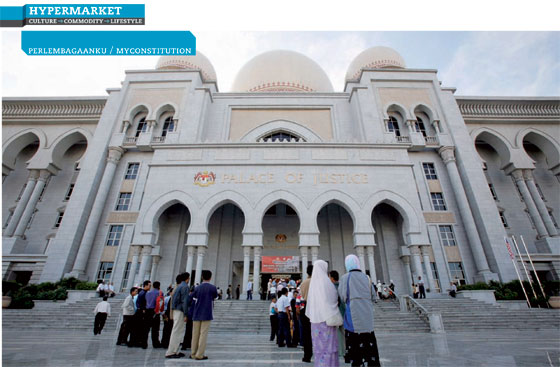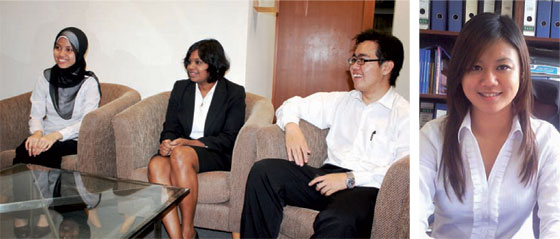
But abolishing the ISA will not be the end of our problems since there are so many other laws that the government can use against political dissidents and those who oppose Umno and Barisan Nasional. And if there are not enough such laws Parliament can always pass more laws.
NO HOLDS BARRED
Raja Petra Kamarudin
‘Junior’ reporters often ask me my stand on the Internal Security Act (ISA). That’s actually quite a stupid question to ask me because I am sure by now many already know the answer to that question.
I remember when Tun Dr Mahathir Mohamad first retired and the reporters asked him now that he has retired will he be spending his time playing golf? If the reporters had done their homework they would have known he is anti-golf and he said so back in the early 1980s when he first became Prime Minister.
Dr Mahathir replied why should he be so stupid as to hit the ball and then go chase after it when it was already with him in the first place?
When asked what his favourite football team is, Dr Mahathir replied why do 22 people chase after one ball? Just buy them one each.
Actually, only 20 people chase the ball. The other two stand in front of the goalpost and try to stop the ball from getting in. They don’t chase after the ball. So Dr Mahathir does not know his football.
So there are some things you do not need to ask, especially if you already know the answer to the question. Or at least do your homework first before interviewing someone.
Anyway, back to the issue of my stand on the ISA. I normally tell the reporters that I am not opposed to the ISA as such. I am opposed to the abuse of the ISA. So it is the implementation or abuse that I am more opposed to, not the actual law itself.
For example, the Umno people argue that Malaysia still needs the ISA to protect the rights of the Malays. That is stupid. How do you reconcile that statement when most of those detained under the ISA are Malays? At least now, although in the beginning it was targeted against the Chinese, in particular the Chinese Communist terrorists. But that has now changed. Now it is the so-called Islamic ‘terrorists’ who are subjected to the ISA.
Talking about Communists, it looks like Ronnie Liu is now accused of being a Communist. Hell, he is sure being accused of many things -- from having links to the underworld to being the protector of pimps and prostitutes. They certainly are trying very hard to bring him down through all sorts of allegations.
Do you know that Communism comes from the word commune or community? And communes or the community are what Islam is all about. Those from the community are referred to as an ummah. In fact, Islam stresses on the importance of the ummah and Muslims refer to each other as Ummah Islam.
Islam teaches its followers that those who travel must travel in a group and someone from that group must be appointed the leader of the community. When you eat don’t eat alone but in a group or community. You get more pahala or credits that way. When praying do not pray alone. Pray in a group or community. You also get more pahala when praying in a group compared to praying alone.
Islam also makes it mandatory to pay the tithe or zakat and fitrah. This is so that those less fortunate in the community can share the wealth. The rich look after the poor in the community. That is the Islamic way. And sharing the wealth is also the way of Communism.
Actually, Islam is all about the ummah or community. This is basically because, in the old days, for security reasons people used to live in communes -- both for personal safety as well as financial security. So you can’t separate Islam from community living or communes. And, as I have always argued, Islam is, in a way, Communism.
So Communism is not new. It is not 100 years old as many believe. It is actually 1,500 years old. Only that it was not called Communism back in the old days but was called ummah. But the spirit of the commune or community living always existed in Islam just like it does today in ‘modern’ Communism.
So they accuse Ronnie of being a Communist. Well, then good for Ronnie because that would make him more Islamic than the 15 million Malays who claim to be Muslims. But whether Ronnie is a Communist terrorist is another matter. No one likes terrorists, whether Communist or Muslim. And terrorism is not confined to Communists. There are as many Muslim terrorists as there are Communists, maybe even more now since Communism is almost dead while Islam is growing.
So let us understand the difference between Communists and terrorists. There is nothing wrong with the first and many things wrong with the second. I am not confirming that Ronnie is a Communist. But even if he is there is nothing wrong with that. Being a Communist just means Ronnie believes in looking after the community. And so does Islam.
Okay, back to the subject of my stand on the ISA. What’s the use of opposing the ISA when it is not the law that is at fault but the abuse of the law? What was the original purpose of the ISA? It was to oppose the insurgency during the Malayan Emergency.
Well the Emergency is now over. The Communist Party of Malaya signed a peace treaty with the government 20 years ago on 2nd December 1989. So the Emergency has officially ended. But the ISA still remains. And it is now used against political dissidents and those who oppose Umno and Barisan Nasional.
That is what makes it wrong.
But abolishing the ISA will not be the end of our problems since there are so many other laws that the government can use against political dissidents and those who oppose Umno and Barisan Nasional. And if there are not enough such laws Parliament can always pass more laws.
So abolishing the ISA is no guarantee that life would be better. What we need to do is to ensure no one gets a two-thirds majority in Parliament. And we must also ensure that all Acts of Parliament require at least a two-thirds majority vote. A simple majority will not do. Then, if any new Acts of Parliament need to be passed, it will need both sides to vote on it -- the government backbenchers as well as the opposition.
However, to achieve this, we first need matured Parliamentarians. Government backbenchers must vote using their conscience, not along party lines, while the opposition must also be matured enough to not oppose for the sake of opposing but support government bills if they are good.
Therefore it all starts from the maturity of those we elect into office. And unless we first achieve this then there is no use arguing about the laws passed in Parliament when the problem lies with the quality of our lawmakers.
That is the most crucial thing that needs to be addressed first. Then we can argue which laws need to be repealed and which need to be amended and whether any new Acts of Parliament need to be passed to address the problems this country is facing.
There are those who want Article 153 and all those other oppressive, suppressive and racial-based Acts to be repealed. Again, what’s the use of doing this if the government is bent on abusing the system and continues to perpetuate state-endorsed racism? Even if Article 153 is abolished it will still not end racism in Malaysia. It will look like racism has ended but they can still find many other ways in which to oppress and suppress the non-Malays.
What we need instead is an anti-discrimination law passed as an Act of Parliament like what they did in Indonesia in late 2007. Make racism a crime punishable in a court of law. And pass a class action law where any Malaysian can take the government to court through a class action suit. Currently, they will use the no-locus-standi ruling on you and throw your suit out.
And, of course, this brings us back to the most crucial issue of all, the Judiciary. If we have a fair and independent Judiciary then the government will have to behave itself because then we can take the government to court. So all these laws mean nothing if there is no proper way to implement them or avenues to challenge them in court.
For example, if we had a good Judiciary, even the ISA can be challenged. And a fair and independent judiciary would look at both the spirit as well as the letter of the law. And based on the spirit of the law there is no way anyone can be detained under the ISA even if it remains in the law books.
When the ISA was passed by Parliament in 1960 it was a specific law, specific to combating the Communist insurgency during the Malayan Emergency. Since the Emergency has since officially ended with the signing of the Peace Treaty in Thailand 20 years ago, the ISA becomes not only irrelevant but also unenforceable. And a good Judiciary will free anyone detained under the ISA.
As long as the Judiciary is not independent and does the bidding of the political masters the government does not need the ISA -- so even if it is repealed it matters not. They can always send you to jail for sodomy even if the doctors come to court to testify that you have erectile problems and can’t get it up.
The final thing I want to talk about is the Malay Mail report below. The Malay Mail has announced it is joining Dr Mahathir’s effort to declare war a crime. I think JAKIM, JAWI, JAIS, JAKUN and whatnot need to investigate this and charge Dr Mahathir and the owners/editors of the Malay Mail for a crime against Islam. These people are going against the Quran and should be sent to jail.
Understand one thing, in Malaysia it is against the law to speak against Islam or preach anything considered opposed to Islam or the Quran. Now, this is not my law. This is what they say is the law. I may not agree with this but since it is the law then it is the law.
You see, even the Quran has not declared wars as illegal. In fact, when talking about wars, the Quran says there may be certain things you abhor but which are necessary. So are these people not ‘amending’ the Quran by trying to get wars declared illegal?
Yes, when it comes to the opposition they use Islam as the excuse to get them. Let’s see what they do to Dr Mahathir and the Malay Mail for trying to declare illegal what even the Quran has not declared illegal. And the Quran does say Muslims must not declare illegal what Islam makes legal and vice versa.
Hey, Islam also declares corruption as a crime. According to Sheikh Imran Hoesin, bribery is riba’ and the sin of riba’ tantamount to the sin of sexual intercourse with your own mother/father. This is not what I say. This is what they say.
In the last sermon of the Prophet in Arafah, the Prophet declared that racism is forbidden. But the Malaysian government practices racism even though Islam declares it illegal and even though they declare Malaysia an Islamic country.
So there are many things that we sidestep and pretend is not happening.
By the way, I am not saying that I support wars. I just wanted to be naughty by bringing up this subject to show that most times they do things for public consumption whereas there are many real issues that need addressing but are conveniently ignored.
*************************************************
‘Malay Mail’ joins move to make war a crime
FORMER Prime Minister Tun Dr Mahathir Mohamad has called for continuous support in highlighting the nation’s efforts to make war a crime.
“The Press has to make people understand that just because war has been around for 7,000 years, it does not mean it’s a right thing to do,” Dr Mahathir said.
“I won’t be around to see a world without war, but what we are doing today is to create it (a world without war) and something we should not allow to perpetuate,”
Dr Mahathir, who chairs the Kuala Lumpur Foundation to Criminalise War (KLFCW), said.
He was speaking at a “thank you” lunch at the Perdana Leadership Foundation in Putrajaya yesterday for all involved in the International Conference Tribunal to Criminalise War and Exhibition from Oct 28 until Oct 31.
He said the conference and exhibition was a success, judging from the massive public support as well as the presence of foreign speakers and visitors. Events like this should be continuous, he added.
During the lunch, Malay Mail chairman Datuk Ibrahim Mohd Noor presented RM30,000 to KLFCW.
The amount was raised by Malay Mail from advertisements in the paper during the conference and exhibition, and was a show of support for the foundation and its cause.
Also present at the lunch were Malay Mail chief operating officer Endie Shazlie Akbar, editor-in-chief Ahirudin Attan, New Straits Times managing editor Nuraina Abdul Samad and Berita Harian group editor Datuk Mior Kamarul Shahid as well as committee members and volunteers who took part in the four-day event.
Volunteers who attended the function shared the same views of the former prime minister that war should be made a crime.
Student Tharan Gunaseelam, 24, said the effort should be continued to make more people aware of war, and its brutality.
“If more people know about it, they will realise that war is a crime against humanity,” he said. Another student, Melinda Tiong, 20, said she looked forward to volunteering for events and causes such as this as she wished to be a part of the movement to create a war-free world.
“War should be a crime. Mass killing is something we should not condone,” she said. – Malay Mail, 10 November 2009




 KUALA LUMPUR, Nov 10 — After recently asking Transport Minister Datuk Seri Ong Tee Keat to resign for not performing, Umno’s Sri Gading MP Datuk Mohamad Aziz is now demanding the Malaysian Anti-Corruption Commission (MACC) investigate the minister’s role in the double-tracking project.
KUALA LUMPUR, Nov 10 — After recently asking Transport Minister Datuk Seri Ong Tee Keat to resign for not performing, Umno’s Sri Gading MP Datuk Mohamad Aziz is now demanding the Malaysian Anti-Corruption Commission (MACC) investigate the minister’s role in the double-tracking project.


 KUALA LUMPUR, Nov 10 — Former chairman of MCA’s legal bureau Datuk Leong Tang Chong today claimed that Datuk Seri Liow Tiong Lai (picture) is still the party deputy president as the Registrar of Societies (RoS) never reinstated Datuk Seri Dr Chua Soi Lek to the post.
KUALA LUMPUR, Nov 10 — Former chairman of MCA’s legal bureau Datuk Leong Tang Chong today claimed that Datuk Seri Liow Tiong Lai (picture) is still the party deputy president as the Registrar of Societies (RoS) never reinstated Datuk Seri Dr Chua Soi Lek to the post. By Syed Jaymal Zahiid - The Malaysian Insider
By Syed Jaymal Zahiid - The Malaysian Insider PUTRAJAYA, Nov 10 — Prime Minister Datuk Seri Najib Razak said today that Malaysia needs a new paradigm if it wants to catch up with developed nations in terms of industrial advancement.
PUTRAJAYA, Nov 10 — Prime Minister Datuk Seri Najib Razak said today that Malaysia needs a new paradigm if it wants to catch up with developed nations in terms of industrial advancement.






 Off the Edge
Off the Edge 
